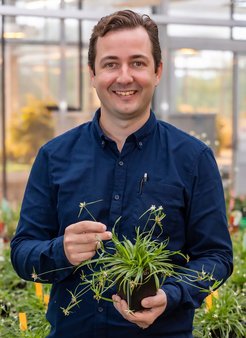MPIPZ researcher receives prestigious ERC starting grant
André Marques, group leader in the Department of Chromosome Biology, has been awarded a prestigious and highly competitive Starting Grant from the European Research Council (ERC). This ERC grant scheme will allow excellent early-career researchers to strengthen their autonomy by advancing their research within the European landscape.
André’s group at the Max Planck Institute for Plant Breeding Research aims to understand the impact of distinctive chromosome structures on both genome evolution and the meiotic adaptations.

Imagine you have a jigsaw puzzle, with each piece representing a genetic part of a chromosome. In eukaryotes, these genetic pieces are shuffled around during the process of meiosis, creating new individuals.
This shuffling is important as it leads to diversity, making each organism unique. One key player in this process, the centromere, acts like a center point helping the chromosomes divide properly during meiosis.
A fundamental question in the field is understanding how the centromere affects the way genetic material is shuffled and passed on. In most plants, these centromeres influence where these shuffling events occur, a bit like magnets pulling the pieces in certain directions.
But here’s the twist: some plants do not have these centromeres in the usual way. Instead, these so called ‘holocentric plants’ have many tiny centromere-like structures spread all along their genetic material. Fascinating, this setup has evolved multiple times in different plant families.
By studying these plants, André hopes to learn how meiosis changes when these centromere-like structures are spread out, and how this impacts the diversity-generating process.
The now ERC-funded ‘HoloRECOMB’ project aims to understand how meiosis works in holocentric plants. By comparing different holocentric plant types, the scientists will be able to understand how this unique setup influences the way genetic material is shuffled.
In addition, the team wants to find out how accidents within the chromosomes – they can break or fuse together - affect the shuffling process and the overall diversity generated.
Furthermore, their objective is to ascertain whether the genetic material shuffling mechanisms in holocentric plants align with those found in pants characterized by a singular centromere configuration.
“Studying these special holocentric plants could give us a better grasp of how nature mixes and matches genes, which has both scientific value and potential real-world applications for agriculture and improving plant traits.”












